Bridging the gap between supply and demand for valuation evidence (BRIDGE)
Introduction
Nature provides a wide range of benefits to people including goods that we consume (such as wild foods or timber), the regulation of our natural environment (e.g. trees store carbon, wetlands help regulate water flows and thus reduce flooding) and the provision of cultural benefits (such as the joy we feel when viewing wildlife).
The capacity of UK natural resources to deliver these valued ‘ecosystem services’, however, has declined dramatically over the last 60 years. Although natural, social and economic scientists have increasingly produced evidence on the immense value of nature, the uptake of this evidence by decision-makers has been limited.
The VNN BRIDGE project investigated the relationship between the 'supply of' and 'demand for' evidence on the value of nature. By better understanding the processes around the generation and uptake of knowledge, and the needs of decision-makers, we can help improve the decisions that policy-makers, businesses and the third sector make.
BRIDGE was slightly different from the other Valuing Nature Network projects in that it was exploring how scientific evidence can best be used to develop more effective policies. A clear message that we have found during a series of workshops with researchers and decision makers is that the scientific evidence produced by researchers is not always in a format suitable to help decision makers design policies. The BRIDGE project investigated how to bring these two communities (researchers and decision makers) together to develop better policies in the future.
Top 10 research Questions
During the discussions, it was clear that there were currently significant knowledge gaps in how the values of nature are used in decision-making. The team identified 28 key research questions to meet these gaps. The top 10 questions were:
- Values for ecosystem services: How can people’s values for different provisioning, regulating and cultural ecosystem services best be identified, measured, aggregated and used in decision-making?
- How to express values: What preferences do people have for the way in which values are elicited (e.g. as individuals or in groups; using monetary or non-monetary measures), and why, and how can valuation techniques be adapted to account for these preferences?
- Deliberation, participation and social learning: What opportunities do deliberation, participation and social learning approaches bring to the development of valuation methods? Do these approaches influence people’s values, do they provide people with different ways to express values, does their usefulness vary between different dimensions of value and types of ecosystem services, and how are the resultant values perceived by decision-makers?
- Evidence needs: What kind of evidence on the value of ecosystems and associated ecosystem services do decision-makers need to improve their decisions, and how do these evidence needs vary across different decision-makers, and in different decision-making contexts and venues?
- Decision-making processes: How do decision-makers incorporate ecosystem knowledge and value evidence in their decisions, and what factors account for this pattern of knowledge use?
- Risk and uncertainty: How do people’s perceptions of risk, uncertainty and vulnerability (particularly relating to changes in ecosystems and the delivery of services) influence their held and expressed valuations and how might these perceptions be measured in a way that generates data useful for decision-making?
- Shared social values: Can people simultaneously possess and express ‘individual’ values, ‘social’ values, and ‘shared social’ values, and, if so, how do they relate to each other and how can they be defined, identified, measured, aggregated and used in decision-making?
- Knowledge: How does people’s existing knowledge and new knowledge acquired in a valuation exercise influence their held and expressed valuations, and how might the impacts of this knowledge be measured in a way that generates data useful for decision-making?
- Empirical evidence: How, why and in what circumstances has the adoption of value evidence, the ecosystems approach, the ecosystem services framework, and/or ecosystem service assessments and value evidence led to ‘better’ policy decisions?
- Making evidence more useful: How can evidence on the value of ecosystems and associated ecosystem services be presented in such a way that it is more useful to particular types of decision-makers in different decision-making contexts and venues?
The above outputs are of interest to both the academic and decision-making communities, and will inform future research on how to provide more targeted and more legitimate value evidence that better meets the demands of decision-makers.
Aims
BRIDGE aims to...
...directly address the Valuing Nature Network challenge 4 by developing a transdisciplinary hub of researchers and decision-makers to investigate how ecosystem service values obtained from natural, social and economic sciences can best be integrated into governance to improve decision-making and implementation.
Objectives
- Objective 1: Assess the state of expert knowledge around VNN challenge 4.
- Objective 2: Clarify central concepts around the supply of and demand for ecosystem service valuation evidence and develop a common vocabulary and theoretical approach to integrating this evidence into decision-making.
- Objective 3: Identify a future research agenda on how to best integrate ecosystem service valuation evidence into decision-making.
- Objective 4: Establish a transdisciplinary hub of researchers and decision-makers that will investigate the interaction between demand for and supply of ecosystem service valuation evidence. These objectives will be addressed through a series of transdisciplinary workshops that will deliver a series of position papers and an agenda for future research.
Outputs
A key output from the BRIDGE project was improved insights into the ways in which decision makers use scientific evidence. This information is extremely useful for both the scientific and decision making communities as it provides guidance to help them better target their resources to undertake more policy-relevant research.
In the long-term, the insights from the BRIDGE project will help to ensure that scientific research is more focused on policy impact, which in turn will help to better protect our natural environment.
The team
Principal Investigator
Prof Mike Christie - Aberystwyth University
Project Mentors:
Administrator
Jasper Kenter - University of Aberdeen
Project management
Mike Christie - Principle Investigator, Values lead, Aberystwyth University
Jasper Kenter - Project administrator and values co-lead, Universities of Aberdeen & St Andrews, Aberdeen Centre for Environmental Sustainability
Duncan Russel - Decisions lead, Exeter University
Core team
As above, plus:
Liz O'Brien - Forest Research
Andrew Church - University of Brighton
Ioan Fazey - University of St Andrews
Rob Fish - Exeter University
EJ Milner-Gulland - Imperial College London
Neal Hockley - Bangor University
Andrew Jordan - University of East Anglia
Decisions stream
Duncan Russel - University of Exeter
Andrew Jordan - University of East Anglia
Liz O’Brien - Forest Research
Bridget Emmett - Centre for Ecology and Hydrology
Neal Hockley - Bangor University
EJ Milner-Gulland - Imperial College London
Susan Page - University of Leicester
Rebecca Sayles - United Utilities / Cranfield University
John Turnpenny - University of East Anglia
Kerry Waylen - James Hutton Institute
Sue Williams - Countryside Council for Wales
Michael Winter - University of Exeter
Eva Zabey - World Business Council for Sustainable Development (WBCSD)
Values stream
Mike Christie - Aberystwyth University
Jasper Kenter - Universities of Aberdeen & St Andrews, Aberdeen Centre for Environmental Sustainability
Ioan Fazey - University of St Andrews
Liz O’Brien - Forest Research
Andrew Church - University of Brighton
Rob Fish - Exeter University
Neal Hockley - Bangor University
Keith Hyams - Exeter University
Katherine Irvine - De Montfort University
Susana Mourato - London School of Economics
Neil Ravenscroft - University of Brighton


